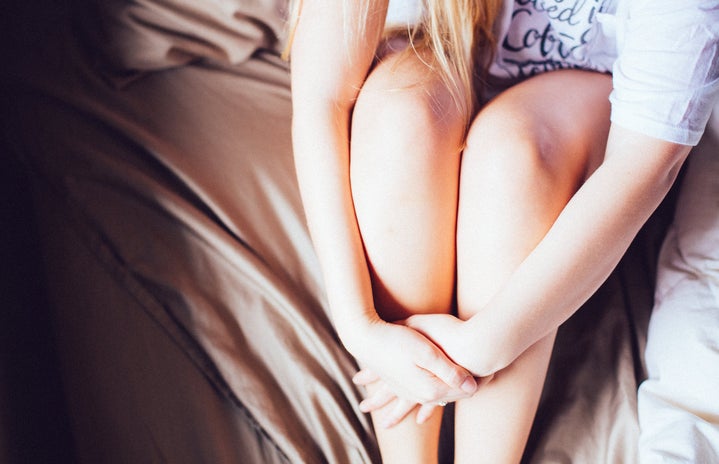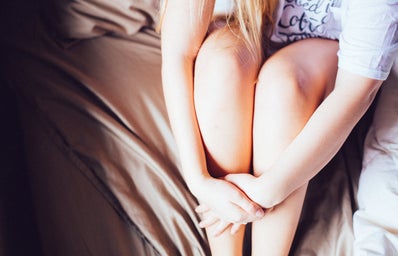In March 2020, I came back to my family’s home, 400 kilometres away from my university and the social life I had built for myself — like many students, I was faced with an abrupt dorm move-out and sudden, teary-eyed goodbyes because of the pandemic.
In my familiar bedroom back home, I was met with boredom, online school, and unexpected distance between myself and my closest friends. I remember looking at myself in the full-length mirror that leaned against a corner of my room while attempting to pull on a pair of new jeans that were disappointingly too small for me. I thought, “No one’s going to see me for a while anyway, and I’ve always wanted to lose weight. Why not?”
In hindsight, number one on the “Why not?” list was probably the negative impact weight loss would have on the way I perceive myself physically and how this could be especially emotionally tolling during a global crisis. But, if I’m being honest, I wasn’t thinking much further than “swimsuit season!” and the misjudged idea that my body image would do nothing but improve.
By the end of quarantine, it did improve, but not in the way I thought it would.
One of my first memories of having issues with body image happened when I was in the second grade. I was sitting in the classroom alone after arriving from a dentist’s appointment in the morning. Recess was just finishing up, and as the bell rang and students began to trickle in, I started to notice the other girls in my class — more specifically, how their legs seemed so much smaller in comparison to mine. I was distracted for the rest of the afternoon, and I remember looking under my desk at my legs, wondering why they looked so big.
They weren’t big. I just thought they were. But the thought that other girls looked so much more “insert-adjective-here” than me would plague my mind for years, right up until university, where I am now. I never felt like I was enough; I was never tall enough, never skinny enough, never cool enough, never pretty enough. Little moments like that one in the classroom, in which I compared myself to my friends, classmates, and favourite celebrities, would follow me into my quarantine weight loss.
It started innocently enough. I figured that weight loss would lead to a healthier lifestyle with the added bonus of feeling better about myself. Stuck inside, I found an old notebook in my childhood bedroom and labelled it as my weight loss diary, then watched dozens of fitness YouTube videos, read comments on online weight-loss forums, and scrolled through lifestyle blogs to figure out how to lose the certain number of pounds I felt needed to go.
I counted calories every single day, used a food scale to weigh everything from cereal to chicken, and updated my weight loss weekly in a little spreadsheet down to the decimal, marking certain weeks with smiley faces or big frown depending on how I felt about that week’s check-in. My weight loss diary became filled with my favourite low-carb recipes, ab workouts, and motivational quotes. It even got to the point where the first thing I thought of when I woke up in the morning was my daily calorie allowance and my last thought before sleeping was the number of steps I had taken that day.
Soon, I saw progress. The too-tight jeans now fit just right, and even my family members began to comment on the difference they saw. This fueled me. I spiralled.
I began exploring other areas of improving my appearance, like following a nightly five-step skincare routine and purchasing new clothes and makeup, all while pushing myself to exercise more and eat healthier to lose the weight. I really thought that if I could just hit that number, then I would finally love and appreciate my body and others would, too.
Just a few months into quarantine, I finally hit that number. My skin cleared up, and I had new clothes and makeup that suited me. But I didn’t feel happy, proud, or even satisfied. The jeans that used to be tight still didn’t look right on me, and I found myself having resentful thoughts about my family members who had never complimented me prior to the visible weight loss and change in appearance. I still felt unattractive, and my legs still looked big.
My love and appreciation for my body hadn’t changed. Nothing did.
Even worse, the internalized, automatic comparisons between myself and other women only became more severe, to the point where I had gathered sexist thoughts towards women I perceived to be prettier, skinnier, and more well-liked than me. The envy I felt within me burned so much it hurt, and it didn’t lessen as I had thought it would before my weight loss began.
At this point, I wasn’t losing weight to shock everyone when quarantine was over. I wasn’t even losing weight to lead a healthier lifestyle.
I was losing weight because I thought that it would make me feel better about myself and make others around me feel the same envy I felt for them. The weight loss didn’t make me happier, nor did it make me love my body.
It made me miserable.
Here’s the reality I soon realized: after your body becomes a few sizes smaller — after your skin clears up, after your closet is filled with new clothes, after your face is covered in new makeup — the only thing you’ll be left with is yourself.
When all you’re left with is yourself, staring back at you in a mirror in the corner of your childhood bedroom, you really see you. If you’re miserable about yourself and others before weight loss, you’ll be miserable after it, too. Your body will change, but honestly? Nothing really changes unless you do. I learned that an entire quarantine too late.
Having a positive body image has nothing to do with how much you weigh. Positive body image has everything to do with appreciating yourself not in spite of what you look like, but because of what you look like, including every freckle, stretch mark, scar, and roll.
Even the best physical health cannot be enjoyed in the presence of poor mental health, and recognizing your patterns, behaviours, and toxic thoughts is the first step to genuinely feeling better about yourself.
When I accessed the mental health resources I had required from the very beginning, I noticed that I began to respect my reflection and the other girls I was surrounded with, appreciating not only what I saw, but also who I saw. I also began to forgive myself for the way I had perceived my body in the past. I have a long way to go, but even little progress is still progress.
So the next time you’re left with yourself, staring at a mirror in your bedroom, promising to change what you see, instead of asking yourself, “Why not?” try asking “Why?”
The answer won’t come from your appearance. It’ll come from you.



